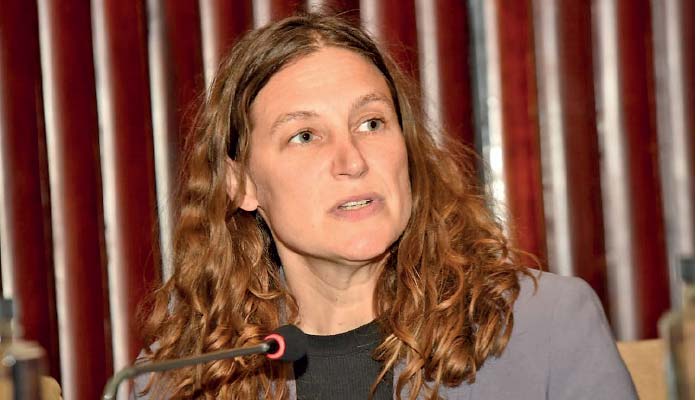Thursday Jan 29, 2026
Thursday Jan 29, 2026
Thursday, 16 October 2025 06:03 - - {{hitsCtrl.values.hits}}

HRW Senior Economic Justice Researcher Sarah Saadoun - Pic by Shehan Gunasekara
Human Rights Watch (HRW) yesterday said Sri Lanka’s ruinous tax policies played a central role in the country’s 2022 economic collapse and continue to deprive citizens of essential public services, calling on the Government of President Anura Kumara Disanayake to overhaul a system that “favours companies and wealthy people while failing to deliver adequate revenues.”
In its 101-page report, “Tax Giveaways, Struggling Schools: How Low Taxes Drove Sri Lanka’s Economic Crisis and Squandered its Education Lead,” HRW said that successive Governments had pursued revenue-starving policies that weakened the State and left the country heavily dependent on regressive consumption taxes.
“For decades, Sri Lanka has been hostage to economic policies that starve its Government of revenue and reflect a myopic focus on GDP growth,” said HRW Senior Economic Justice Researcher Sarah Saadoun. “These ruinous tax policies have left education spending well behind the pace of growth, turning Sri Lanka from a global leader in public education to a laggard.”
The report said public spending on education had declined from between 3 to 5% of GDP in the two decades after independence to 1.5% in 2022, one of the lowest ratios in the world.
HRW said the resulting funding gaps had forced schools to charge fees for basic resources, widening disparities between the rich and poor and undermining children’s right to free education.
It added that Sri Lanka’s low revenue base also contributed to the country’s historic debt default in April 2022, which triggered job losses, soaring inflation, and a prolonged social crisis. HRW said the problem began with the liberalisation policies of the late 1970s but was exacerbated by former President Gotabaya Rajapaksa’s sweeping 2019 tax cuts, which “dealt a devastating blow to revenues.”
The report found that by 2022, tax exemptions granted to companies cost the Treasury an amount equivalent to 56% of total revenues, almost three times the national education budget. It also noted that 80% of Sri Lanka’s tax income came from goods and services, burdening lower-income households disproportionately.
“Sri Lanka’s economic quagmire makes it clear that growth alone is not enough to fulfil human rights,” Saadoun said. “The Government should finally establish a progressive tax system and use its income so that it adequately funds education and other public services that benefit all Sri Lankans.”
HRW urged the Government to eliminate costly corporate tax exemptions, introduce a wealth tax, and strengthen enforcement mechanisms. It said Sri Lanka’s experience illustrates how tax competition among developing countries has spurred a global race to the bottom that undermines human rights.
The group said that while the Disanayake administration has taken limited steps, including a Rs. 6,000 transfer to poor families, it has yet to significantly expand the education budget.
It urged the Government to raise spending to at least 4-6% of GDP in line with international standards and to align fiscal policy with its human rights obligations to mobilise the maximum of available resources for education, health, and social protection.